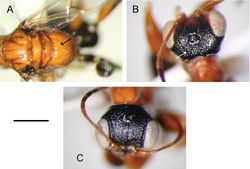Deinodryinus bimaculatus
| Notice: | This page is derived from the original publication listed below, whose author(s) should always be credited. Further contributors may edit and improve the content of this page and, consequently, need to be credited as well (see page history). Any assessment of factual correctness requires a careful review of the original article as well as of subsequent contributions.
If you are uncertain whether your planned contribution is correct or not, we suggest that you use the associated discussion page instead of editing the page directly. This page should be cited as follows (rationale):
Citation formats to copy and paste
BibTeX: @article{Speranza2018ZooKeys, RIS/ Endnote: TY - JOUR Wikipedia/ Citizendium: <ref name="Speranza2018ZooKeys">{{Citation See also the citation download page at the journal. |
Ordo: Hymenoptera
Familia: Dryinidae
Genus: Deinodryinus
Name
Deinodryinus bimaculatus Speranza & Olmi & Guglielmino & Contarini, 2018 sp. n. – Wikispecies link – ZooBank link – Pensoft Profile
Diagnosis
Female with head not provided with two oblique keels connecting posterior ocelli to occipital carina (Fig. 2B); head without frontal line (Fig. 2B); forewing with two dark transverse bands (Fig. 2C); metapectal-propodeal complex strongly reticulate rugose, mainly on metapostnotum (Fig. 2D).
Description
Female. Fully winged (Fig. 2). Length 2.4 mm. Head black, except mandible, clypeus and gena testaceous. Antenna testaceous, except antennomere 10 slightly darkened. Mesosoma black, except anterior, posterior and lateral margins of pronotum testaceous. Metasoma brown. Legs testaceous, except metacoxa partly brown, club of metafemur and metatibia with brown spot. Antenna clavate. Antennomeres in following proportions: 9:5:10:7:5:5:5:5:5:6. Head dull, granulate (Fig. 2B). Frontal line absent. Occipital carina complete. Head without oblique keels connecting posterior ocelli to occipital carina (Fig. 2B). POL = 3; OL = 3; OOL = 5; OPL = 6; TL = 6. Greatest breadth of lateral ocelli shorter than OPL (2:6). Pronotum shiny, punctate, unsculptured among punctures, sculptured by many transverse striae, with posterior surface about as long as mesoscutum. Mesoscutum shiny, very slightly granulate, mainly on lateral regions. Notauli incomplete (Fig. 2B), reaching approximately 0.6 × length of mesoscutum. Mesoscutellum and metanotum shiny, unsculptured. Metapectal-propodeal complex dull, reticulate rugose and granulate, without transverse or longitudinal keels (Fig. 2D). Metapostnotum and first abdominal tergum not separated by transverse keel. Forewing hyaline, with two dark transverse bands (Fig. 2D). Distal part of stigmal vein longer than proximal part (8:6). Protarsomeres in following proportions: 7:3:4:10:18. Enlarged claw (Fig. 3) with one bristle situated further distally than proximal prominence. Protarsomere 5 (Fig. 3) with two rows of about 46 lamellae and distal apex provided with approximately six lamellae, among which one much longer than others. Tibial spurs 1/1/2. Male. Unknown.
Material examined
Holotype: female, USA: Texas, Bastrop Co., Buescher State Park, 29.iv–10.v.1990, R. Wharton leg. (TAMU).
Hosts
Unknown.
Distribution
USA (Texas).
Etymology
The species is named bimaculatus (adjective formed by the prefix “bi-“ meaning “two” + the Latin adjective “maculatus”, meaning “spotted”), because its forewing shows two dark transverse bands.
Remarks
On the basis of the morphological characters indicated in the above diagnosis, D.bimaculatus is similar to D.masneri (Olmi, 1984), but it differs because the head has no frontal line (frontal line present in D.masneri) and the forewing has two dark transverse bands (no dark bands in D.masneri). Following the description of the new species, the key to the females of Nearctic Deinodryinus published by Olmi (1984)[1] can be revised as follows:
Original Description
- Speranza, S; Olmi, M; Guglielmino, A; Contarini, M; 2018: A new species of the genus Deinodryinus Perkins (Hymenoptera, Dryinidae) from the USA ZooKeys, (809): 31-39. doi
Images
|
Other References
- ↑ Olmi M (1984) A revision of the Dryinidae (Hymenoptera). Memoirs of the American Entomological Institute 37: i–xii + 1–1913.



